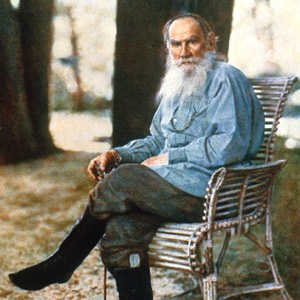
Leo Tolstoy (1828 – 1910), also known as Count Lev Nikolayevich Tolstoy, was a Russian writer who is regarded as one of the greatest authors of all time. He is best known for his novels, including War and Peace and Resurrection, but he also wrote plays and numerous philosophical essays. His fiction consistently attempted to convey realistically the Russian society in which he lived. In the 1870’s Tolstoy experienced a profound moral crisis, followed by what he regarded as an equally profound spiritual awakening, as outlined in his nonfiction work A Confession.

Quotes by Leo Tolstoy…
(If people changed inwardly) They would be different, richer, and higher, but would not at all be discontinued. What would be destroyed is whatever is false in them, while whatever is true in them would blossom and grow stronger.
There are some men — but the smaller number — who instantly, and as though by prophetic intuition, perceive the truth, surrender themselves to its influence, and live up to its precepts. Others — and they are the majority — are brought to the knowledge of the truth and the necessity for its adoption, by a long series of errors, by experience and suffering.
However much we have dulled ourselves with hypocrisy, and dulled ourselves with the self-suggestion resulting from hypocrisy, nothing can destroy the absolute certainty of that simple and clear truth that no exterior effort can provide us with security.
The man who spends his life in sensual acts performs acts that depend on temporary causes beyond his control. Of himself he does nothing, but it seems to him that he is acting independently. In reality, all that he imagines he is doing by himself is done through him by a higher power; he is not the creator of life but its prisoner. But the man who devotes his life to the recognition and practice of the truth revealed to him unites himself with the source of universal life, and accomplishes not personal or individual acts that depend upon time and space, but acts that have no cause, but are in themselves causes of all else, and have an endless significance.
It seldom happens that a man changes his life through his habitual reasoning. No matter how fully he may sense the new plans and aims revealed to him by reason, he continues to plod along in the old paths until his life becomes frustrating and unbearable… he finally makes the change only when his usual life can no longer be tolerated.
An idea about God is not God.
It is the recognition or non-recognition of these principles that a man finds or fails to find freedom.
If you did not desire your present position, you would not be doing everything possible to maintain it… If you cease doing those things which maintain your position, you will lose at once that position which you claim is forced upon you and which is your burden… It is impossible for any man to be placed against his own will in a condition which is contrary to his conscience.
Each man in his perception of truth is like a traveller who walks by aid of a lantern whose light is cast before him: he does not see what as yet has not been revealed by the beams, he does not see the path he has left behind… but at any given step he sees that which the lantern reveals, and he is always at liberty to choose one side of the road or the other.
There comes a time when, on the one hand, a vague awakening consciousness stirs the soul, the consciousness of the higher law… and the sufferings a man endures from the contradictions of life, compel him to renounce the social order and to adopt the new… And this time has now arrived.

